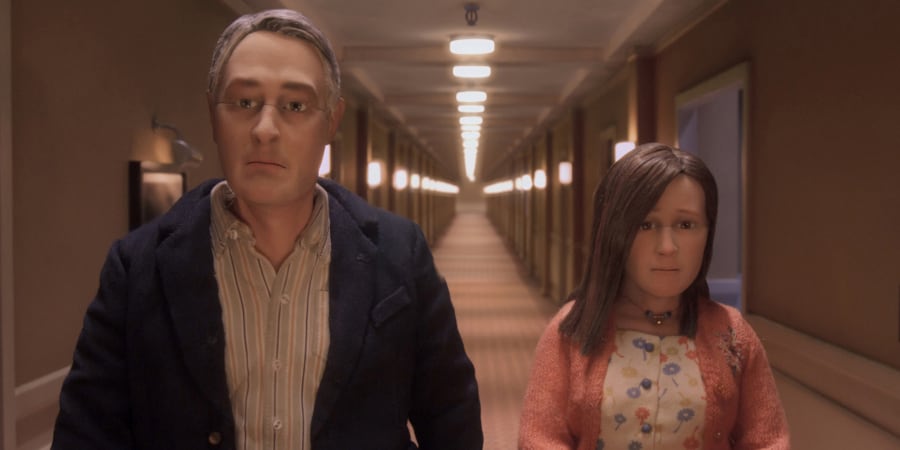
Everyone looks the same to Michael Stone. He is in Cincinnati to give a talk at a conference and is staying at the Hotel Fregoli. After failing to make a connection with an ex-lover, he becomes fascinated by an antique Japanese sex toy. He seems unable to make a connection with anyone.
Then he hears a voice through his hotel door. Anonymous Lisa. Anomaly Lisa. Lisa’s voice and face are different, so Michael becomes enraptured by her. His interactions with Lisa in his hotel room are sweet, if a little manipulative. He is desperate for something real in his life, an authentic person who is not like everyone else, something that he hasn’t fucked up. The scene where they make love is beautiful. Animated intimacy surprised me, perhaps because it was more intimate and real than most sex scenes I’ve seen with real actors.
The nightmare he has that night reveals the horror of his situation. In the basement he meets the hotel manager who says he is in love with Michael, and that he can fuck anyone at the hotel but Lisa. Michael is falling in love with her and his unconscious is telling him he has to protect her, because he is going to ruin it, ruin her. He has brought her out of herself and her vulnerability terrifies him. The next morning her voice begins to change and she starts to become like all the others.
Michael has a breakdown on stage as he gives his talk — he is trapped in his own self-absorption, or perhaps a medical condition, we can’t know. He returns home and is faced with the same face wherever he goes. His family is no comfort. He doesn’t know how to connect with his wife or son. But Lisa is transformed by the experience and heads off into her life renewed. It’s a smart reversal in a film full of doubles. Multiples, in fact.
The hotel is a metaphor for Michael’s psyche, twisted and pulsing with his emotional experience. The story is told in three thirty-minute acts: arriving at the hotel, his night with Lisa, and the consequences. The dialogue is awkward and authentic, and it took me a while to realise all the faces and voices of periphery characters were the same. That was unnerving. It made me wonder if I had the same problem as Michael Stone. And the lines on the characters faces were freaky too. I didn’t know they were puppets, so it added to Michael’s paranoid, nightmarish view of the world. You only realise how ill he is at the very end.
It’s a terribly sad story for him, but an uplifting one for Anomalisa. Brilliant.